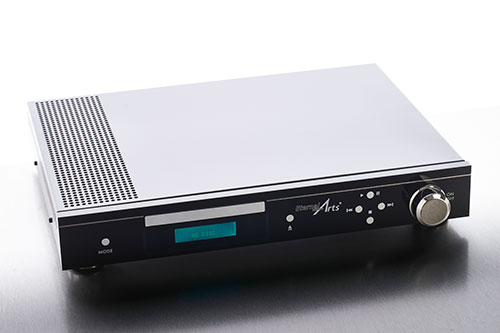
Of course, I also played high-definition formats on a Macbook Pro with Amarra software. Brient recommends the software JPLAY in the "extreme hibernate" mode. Then, all the troublemakers such as the mouse, keyboard, monitor, and everything else like that should be turned off. But this only works with Windows computers. So back to the Macbook and the selection Keith Jarrett's “Köln Concert”. I have the record, CD and 24/96 HighRes versions. The differences between the CD and HighRes are minimal and in a double blind test, I would probably have difficulties.
Next, I tried a 24/192 recording: “A Trace of Grace” by Michel Godard. I have an advantage with his recording because I have also heard this group live and therefore, I can really imagine what this should sound like. Here again, the difference to the Redbook format is not such that it would cause me sleepless nights. It was most noticeable with the violin by Fanny Pacoult. It sounds a bit more natural on the high-definition format. Admittedly, this may be the decisive improvement for a classical music fan. Nevertheless, it is remarkable what the totaldac brings out of the Redbook format.
And now with a vengeance: In a heroic self-experiment, I then played a file with the lousy sampling rate of 256 kbits/s, ZZ Top Live: “Blue Jeans Blues”. I was totally blown away how the totaldac dealt with this recording. Actually, I was expecting the worst, but the incredible force of the music from the three men with the long beards is amazingly live sounding. The quality of the recording as well - the tube DAC didn't gloss over anything. Of course, no fine resolution is required here - which doesn't exist. I didn't want to subject myself to a classical recording in this format. Nevertheless, it was quite amazing. Um, a plea for the mp3 - or whatever that thing is called - this is certainly not one! 
-
EternalArts DP MkII
Der neue EternalArts DP MkII ist ein CD-Player und Digital-Audio-Wandler mit Röhrentechnik. Die Bezeichnung ist etwas irreführend, denn das MkII bedeutet in diesem Falle nicht, dass es sich um eine überarbeitete Version handelt. Vielmehr ist er technisch und klanglich seinem deutlich teureren Bruder sehr ähnlich. EternalArts geht mit dem DP MkII erstmals einen anderen Weg: Der neue CD-Spieler mit extern zugänglichem integriertem Digital-Analog-Wandler wird ausschließlich direkt ab Werk verkauft. Nur so lässt sich laut Dr.…18.11.2019 -
SPL Director Mk2
Aus der Redaktion erfuhr ich, dass mein Kollege Jürgen Saile vom SPL Phonitor XE Kopfhörer-Verstärker mit dem neuen DAC 768 Wandler-Modul ganz begeistert sei, wie Sie inzwischen ja auch lesen konnten. Nun steht bei mir das Vorverstärker-Pendant, der SPL Director Mk2, der in einigen Aspekten gleichartig ist. Die SPL-Entwickler und Produktdesigner – federführend ist bei der Professional Fidelity-Linie Bastian Neu – verstehen es, ihre Voltair-Technologie in relativ kleinen Gehäusen unterzubringen. Dennoch findet man nicht nur…29.10.2019 -
Moon 780D V2 Streaming DAC
Das digitale Flaggschiff der kanadischen Nobelmarke Moon macht optisch eine Menge her. Der DA-Wandler mit integriertem Streaming-Modul verspricht tollen Klang und verbindet Eleganz mit Bedienungskomfort. Er ist jedoch kein billiges Vergnügen. Seit wenigen Monaten kümmert sich Dynaudio um den Vertrieb der Marke Moon des kanadischen Herstellers Simaudio. Dynaudio ist mit seinem flächendeckenden Händlernetz in Deutschland und Österreich ein bestens aufgestellter Partner. Der eigene Anspruch der Kanadier und ihr Versprechen auf der hauseigenen Website liest sich…16.09.2019 -
Playback Designs Merlot DAC und Syrah Server
Wie wäre es mit einer Server-Wandler-Kombination, die praktisch alle Formate und Abtastraten problemlos abspielen kann, ihren ganz eigenen klanglichen Charakter hat und obendrein noch einfach zu bedienen ist? Interessiert? Dann erkunden Sie doch gemeinsam mit mir den DAC Merlot mit dem dazu passenden Server Syrah von Playback Designs. Der Merlot ist das Herzstück der Sonoma Serie von Playback Designs, der die anderen Geräte aus dieser Linie, den Syrah Musik-Server, den Analog-Digital-Wandler-Pinot sowie die OpBox zum…15.10.2018 -
artistic fidelity arfi-dac2xt
Dieser D/A-Wandler der gehobenen Preisklasse kommt ohne verchromte Frontplatte aus, trägt weder den Namen eines Komponisten noch den einer Gottheit, sondern heißt schlicht: arfi-dac2xt. Er besitzt keinen der vertrauten AES/EBU-, S/PDIF- und USB-Eingänge, akzeptiert PCM nur bis 192 Kilohertz und kein DSD. Wirklich spannend! Das ist übrigens nicht im mindesten ironisch gemeint: Denn der dac2 aus artistic fidelitys XT-Serie kann mit einer Reihe hochinteressanter, weil eigenständiger Lösungen aufwarten. Sein Entwickler Ralf Koschnicke nimmt keine Rücksicht…21.08.2018 -
B.audio B.dpr
Als sich das Team des noch jungen Unternehmens B.audio zum Besuch in der Redaktion bei Hifistatement ankündigte, waren Dirk Sommer und ich in freudiger Erwartung. Denn mit im Gepäck hatten Sie ihr Erstlingswerk, einen klassischen Digital-Analog-Wandler, der „klanglich das ‚Digital‘ aus Digital-HiFi entfernen soll“. Wir freuen uns immer, wenn Unternehmen uns ihre Geräte zum Test anbieten. Bei Newcomern sind wir hier immer offen, aber auch kritisch und mitunter etwas skeptisch, wenn besondere Versprechungen gemacht werden.…30.04.2018
© 2025 | HIFISTATEMENT | netmagazine | Alle Rechte vorbehalten | Impressum | Datenschutz






















 |
|


































































































